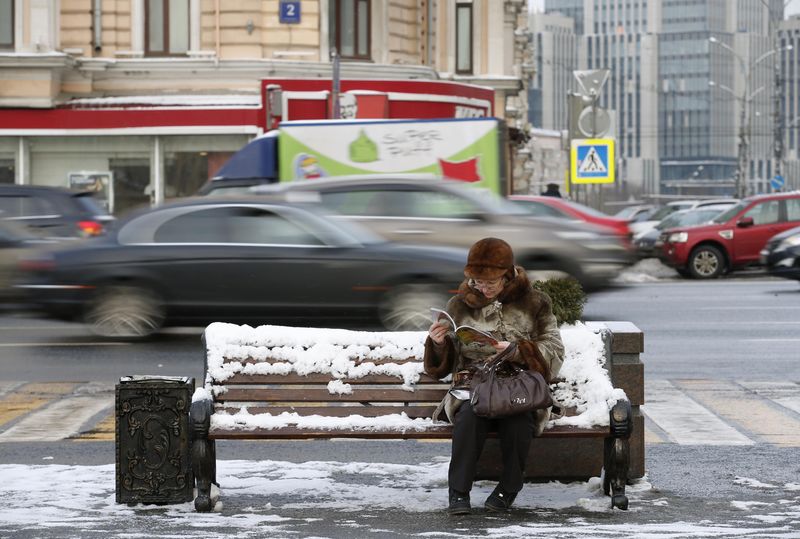By Elizabeth Piper
MOSCOW (Reuters) - For Boris Lisitsyn, Russia's financial crisis means less meat, cheese and sausage - hardships the 86-year-old says won't kill him anytime soon.
But for him and the millions of pensioners who make up about a third of Russia's population, rising prices are also spurring anger over declining living standards, threatening a pool of support President Vladimir Putin cannot afford to lose.
Russia's pensioners were once seen as "people we just needed to support" one government official said. But with women able to retire at 55 and men at 60, and healthcare improving, many are becoming more forceful in their demands.
It's a trend not lost on Putin, whose role as a protector of stability, social conservatism and generous state spending has won a strong following among the elderly. Their loyalty is now being tested by a financial crisis triggered by low oil prices and Western sanctions imposed on Russia over Ukraine.
The Russian leader has dismissed any thought of cutting social spending, telling the government this month: "First of all, whatever we do and whatever plans we make, we must ensure the fulfilment of our social commitments."
But even with those commitments met, and increases in benefits promised, life for millions is becoming difficult.
"In the 1990s there was nothing in the shops but fridges were full," Lisitsyn said, referring to the collapse of the Soviet Union which shattered supply lines and the command economy, forcing many to rely on home-grown produce.
"Now it's the other way round - there's everything in the shops but fridges are all but empty," said the former military officer and radio factory worker.
Sitting at a small formica table in the kitchen of his two-room flat in a Moscow suburb, Lisitsyn said he struggles to keep up with price rises for food and medicine, saying sometimes he walks into a shop "only to walk out again".
PRICES LEAP
Prices leapt last year in Russia as the rouble crashed 40 percent against the dollar, dragged lower by plunging prices for the country's key export oil and Western sanctions that have all but shut companies and banks out of global capital markets.
Annual inflation reached 11.4 percent in December, according to official statistics, with meat up by more than 20 percent and the retail price of sugar rising 40 percent.
The average monthly pension stood at 10,029 roubles ($148 at today's exchange rate) in 2014, the Federal Statistics Service said.
Pensioners say one of the biggest blows from the crisis is the rising price for medicine, most of which are imported. For Nina Frolova, 84, about a fifth of her 15,000-rouble pension goes on medicine. Other outgoings include 1,500 roubles a month on her subsidised Moscow flat, 150-200 on electricity and 350 roubles on the telephone bill.
What hurts most, Lisitsyn says, is the sharp deterioration in his way of life.
Once he felt quite well-off, now he describes watching in horror as a woman living in one of Moscow's most desirable areas, known as Rublyovka, recounts her daily life on a morning television show.
"She threw down a black rug and ... scattered something on the rug. They were diamonds, thousands of them. And she walked over them barefoot and said: 'This is the best kind of massage'," Lisitsyn said.
"I just couldn't understand it. Why would someone do that? ... At the top they live in a different reality."
"ABOMINABLE" LIVING CONDITIONS
The extent of the wealth gap is most obvious far from Russia's big cities such as Moscow.
Eduard Karyukhin, director of Dobroe Delo, a non-governmental group, said many of Russia's more than 43.3 million pensioners live in rural areas, where mortality rates are high and living conditions "abominable". They make up the majority of the 20 percent at high risk from the crisis, he said.
The government has promised action, but it comes at a cost.
Officials have hinted at possible price caps and Putin has promised to index pensions to inflation, although senior ministers have cast doubt over whether this is affordable.
Russia's State Pension Fund is projected to spend around 7.6 trillion roubles, equivalent to 10 percent of gross domestic product, this year. More than a third of the amount (2.8 trillion roubles) will be funded from budget transfers that swallow up 18 percent of the federal budget.
On the quiet, officials may be trying to minimise costs. This year, a new programme offers points for every year worked beyond retirement age to go towards a higher pension. Putin has also called for a push to keep Russia's elderly active.
That may backfire.
Karyukhin said elderly people were now helping each other, and they "may gradually gain strength and defend their rights".
"There are concerns among the authorities that they need to try to regulate this," he said.

($1 = 67.7900 roubles)
(additional reporting by Jason Bush and Tatiana Ustinova; editing by Janet McBride)